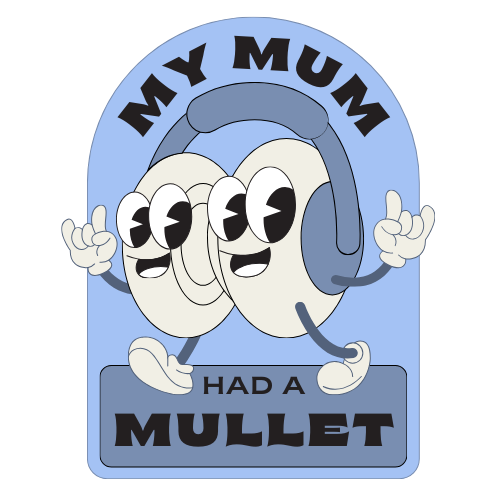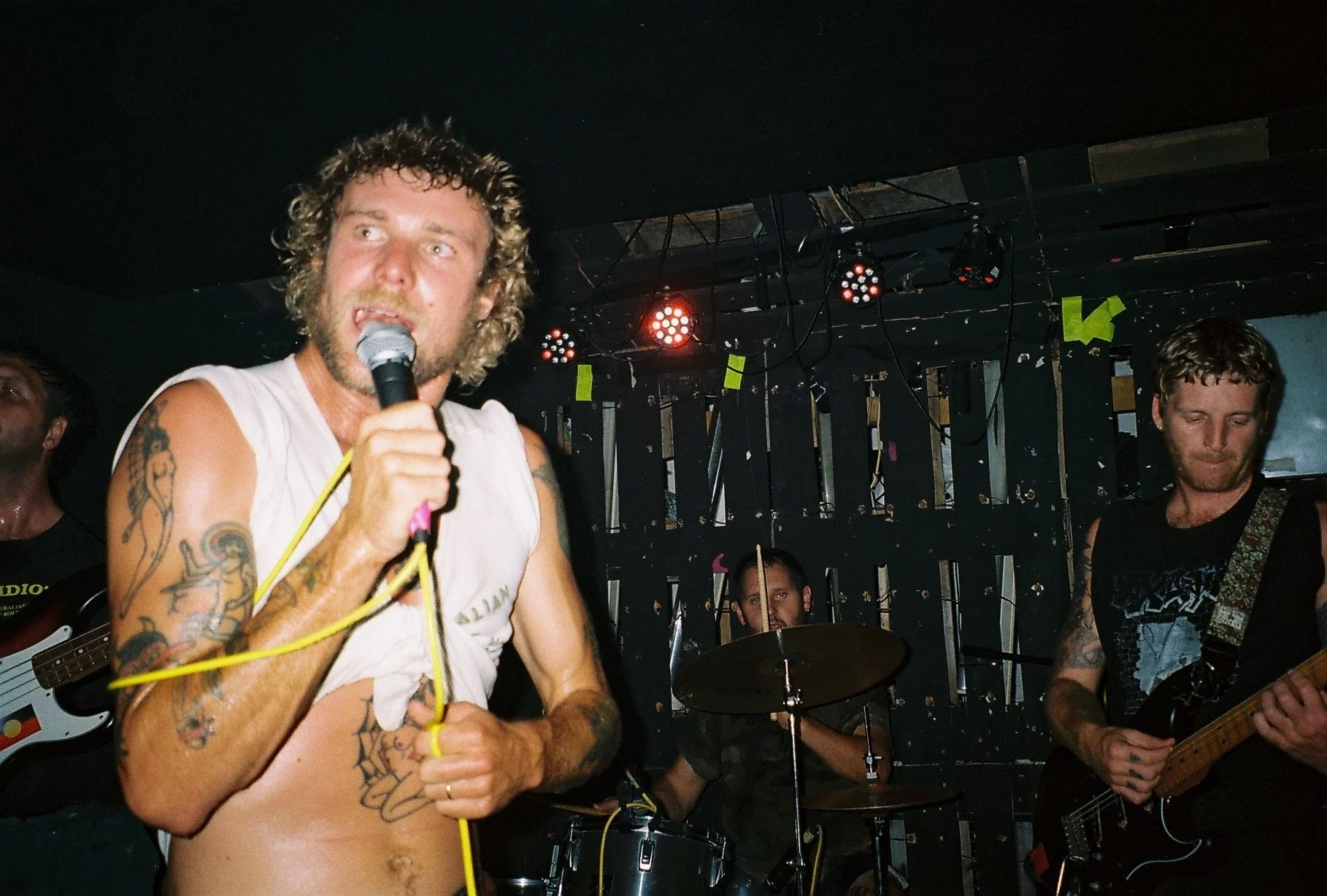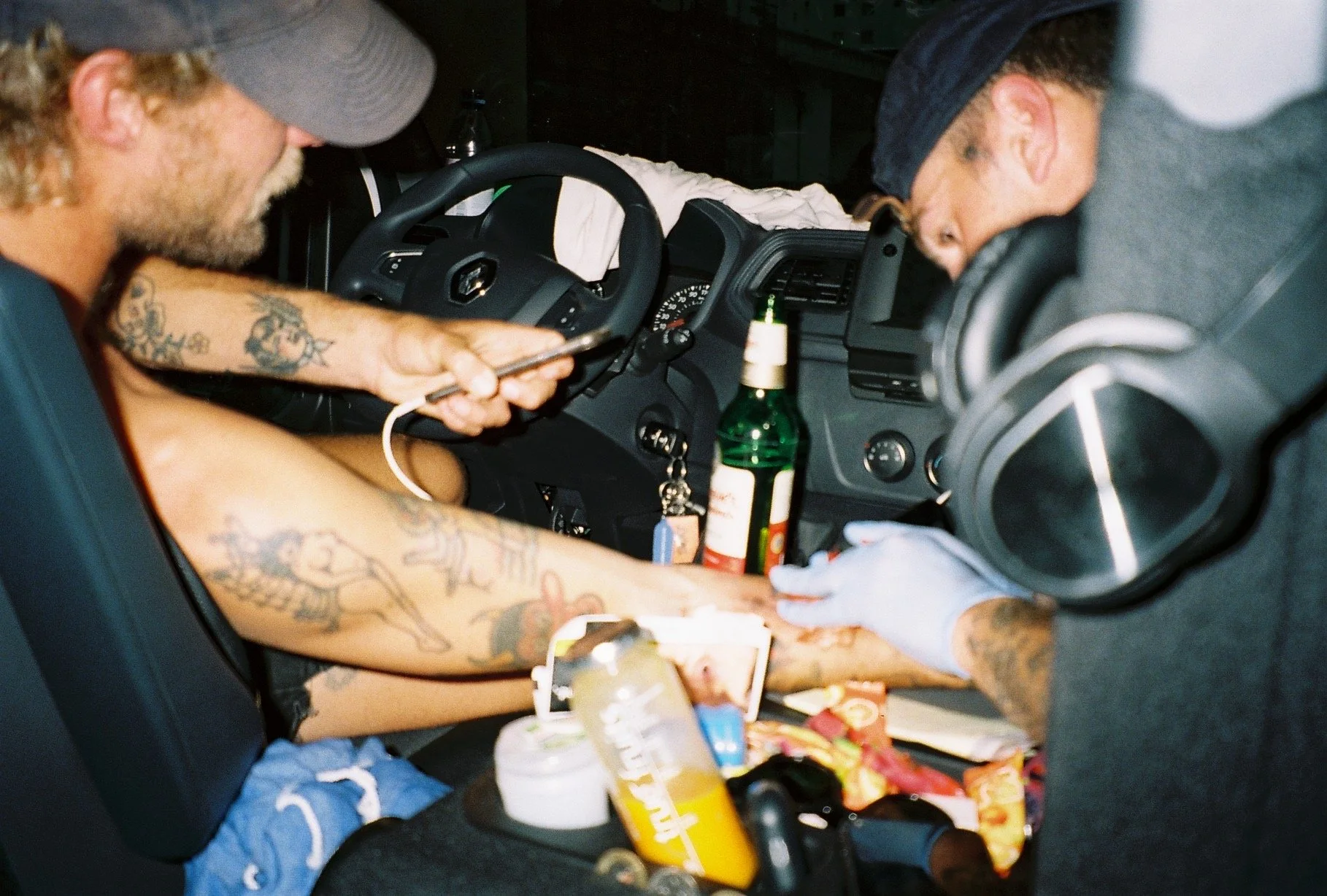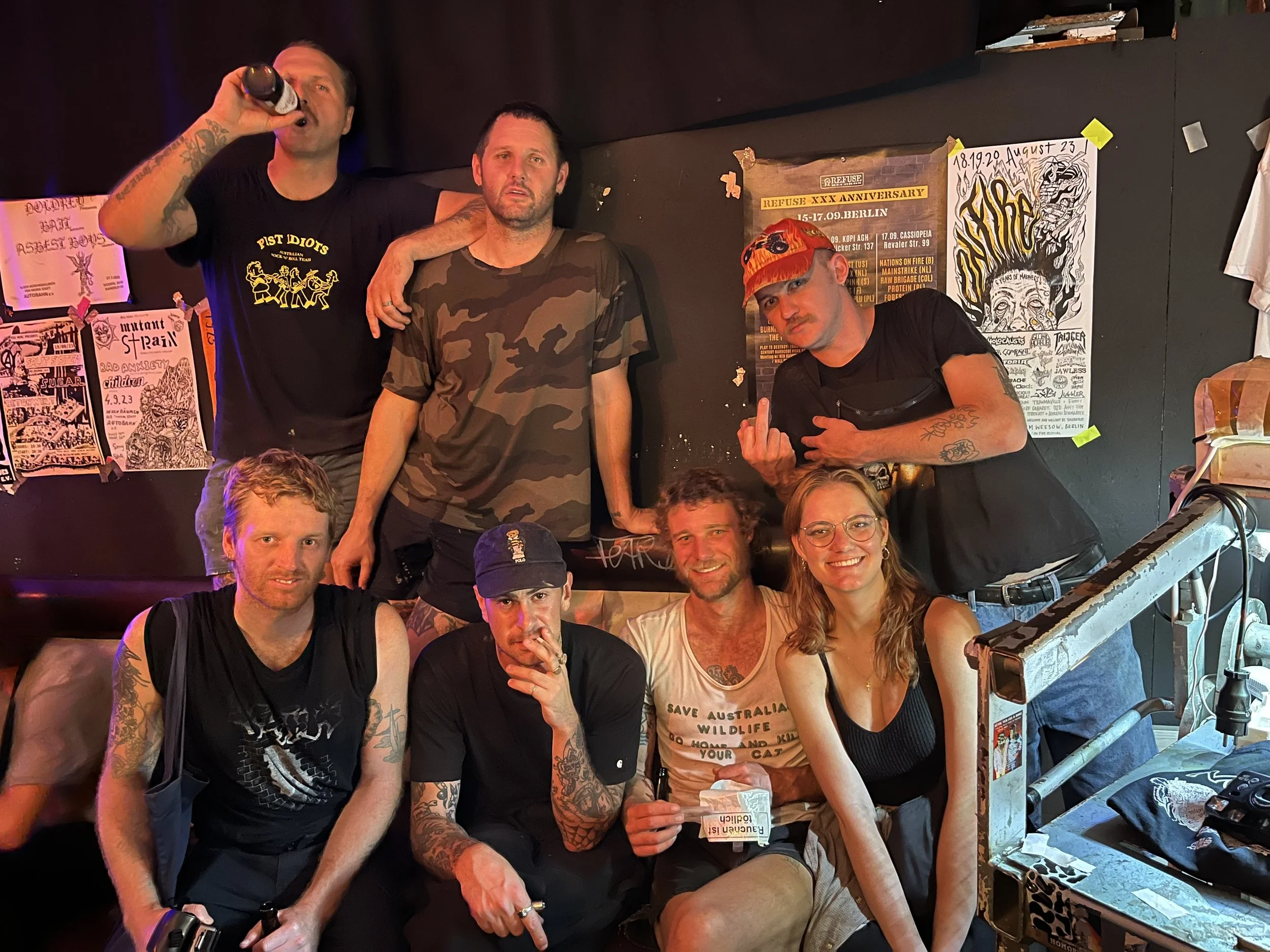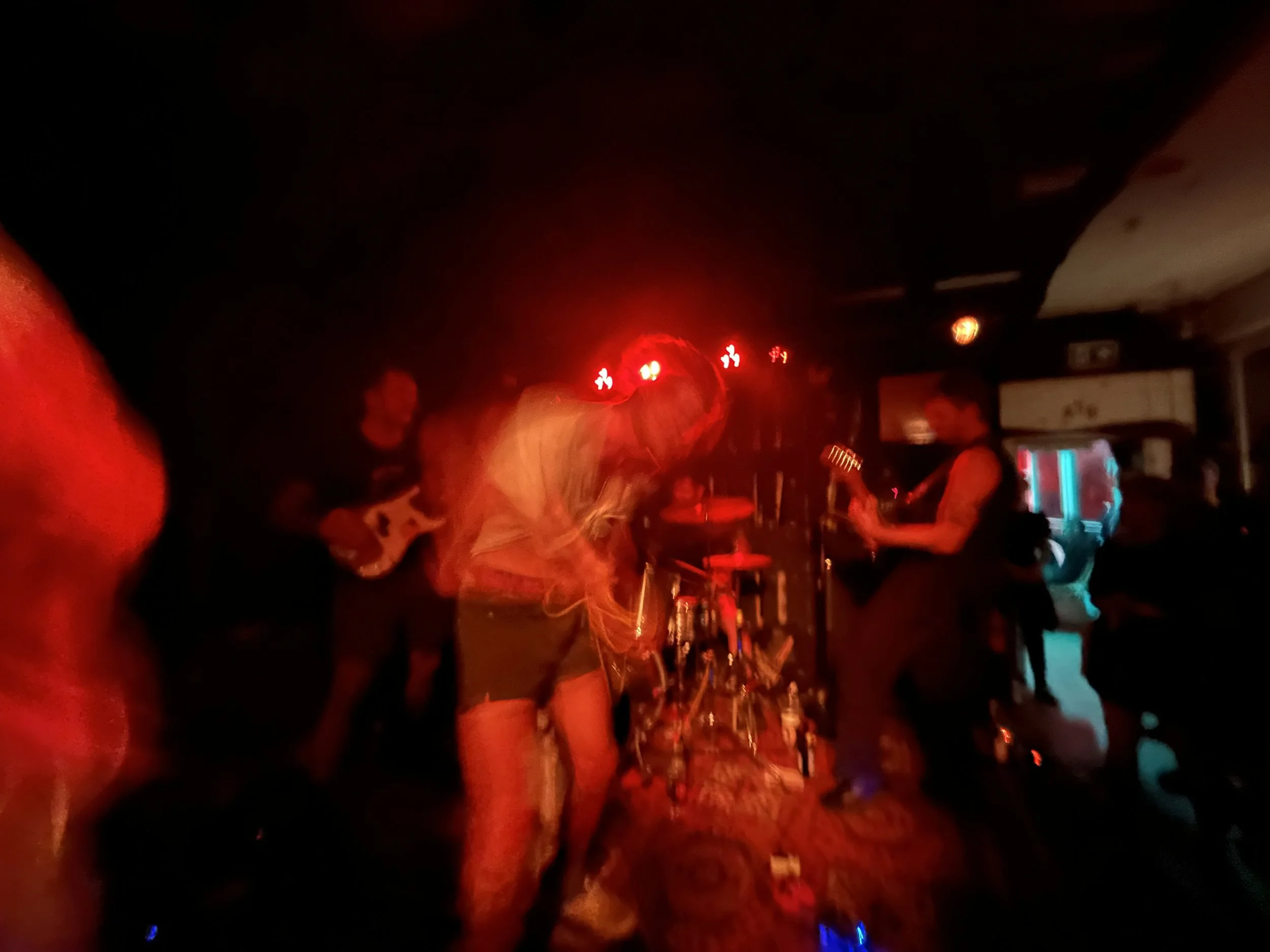A night in Berlin with Mini Skirt
An honest chat about Australian music, punk, and tall poppy syndrome.
Mini Skirt performing at a secret venue in Berlin. Photo by me.
Mini Skirt first hit my radar back in mid-2021. I was immediately sucked in by the audible Australian accent and the raspy voice. What kept me hooked was the no-bullshit, fast, loud, quintessential punk. It sounded simultaneously like the classics and like nothing I had ever heard.
Jacob Boylan’s stream-of-consciousness lyrics cover everything from Australia’s political landscape to grocery shopping. When asked if he wanted to join the band that needed a singer, he said something along the lines of, “I can’t really sing, but I can scream pretty good.”
And scream he did.
In fact, he was about to do some screaming in Berlin on a night that I happened to be in town. I messaged Mini Skirt’s Instagram asking if they’d like to chat before their show. To my surprise, they say yes.
A few hours later I’m walking to the venue, keeping an eye out for Mini Skirt. Eventually, I spot a group of tattooed men sipping Berliner Kindls around a rental van. There they are. When I nervously introduce myself, trying not to make it obvious that I’ve never done this before, they greet me warmly and welcome me into the van, where I watch Jacob Boylan (vocals) get a tattoo.
I sit in the back seat, recording the conversation for over an hour. I speak mostly to the two Jacobs—Boylan and Pumphrey (drums)—and we cover all kinds of topics including the Sex Pistols and AC/DC, (almost) fighting Nick Cave, the Australian music scene, tall poppy syndrome, and punk fashion. We start with Boylan’s visual art.
You make a lot of art, which is super cool. Are there any parallels either in the look or in the general ethos of punk with your visual art?
Boylan, vocals: Yeah, when the band started, it really felt like an extension of the art. It’s frustrating exhibiting artworks in galleries or wherever, and the artworks just kind of sit there, and everyone projects their own stuff onto your artworks. But when you have a show, you get to project your own shit onto other people. So I like that part, and also because no one wants to really look at an artwork that’s just a bunch of words, so it’s kind of like a more direct way of explaining whatever I was caught up with trying to make artworks about. They’re kind of one and the same, but for the music stuff I kind of have to simplify it a bit more to put it into words. And I try to be as direct as possible with the lyrics. Like it’s funny sometimes people will ask me “what’s this song about?” and I’m like, “what more do you want me to say? Like it’s all in the song.” Like it’s pretty direct, I’m not using abstract or complex metaphors. And I do that on purpose, to make it accessible.
That makes total sense, the simplicity of it. How do you usually write a song?
Boylan: Sometimes it’ll be like, a whole lot of stuff in one go, and that’s pretty much a whole song, and other times it’ll be bits and pieces here and there, and I’ll compile them a bit. Or I might have a little bit started, and once we’re all together then the pressure’s on to have the words ready, so I have to revisit it, but that spur of the moment thing makes it so you don’t have much time to fuss around with it. And sometimes if nothing good’s coming to mind, I’ll ask the guys to send me music they’ve written and I’ll write something to it.
Yeah, because I was thinking about Nick Cave, who treats his writing like a full-time job, waking up at 8AM and just writing all day.
Boylan: Yeah but he gets paid to do it! [laughs] He makes a lot of money doing that! But I like Nick Cave. Jacob and Jesse (Pumphrey), their dad tried to fight Nick Cave one time. Jacob, tell the story!
Pumphrey, drums: Yeah, when they were kids. Nick Cave was really good friends with my dad’s best friend, who had just got into art school with Nick Cave, and they’d always go to parties together, and supposedly Nick Cave was always a bit of an asshole to women. Supposedly he’d get drunk and be a bit obnoxious. My dad hated art school kids and kind of rich kids and stuff, I think he had a bit of a bone to pick with that crowd. So something happened one night, and he said something mean to a girl, and my dad stood up and pushed him and tried to fight him, and everyone ran in and broke it up. But still a funny story. I love to remind him of it, and he’s super embarrassed about it.
You’re really making Australia sound like a village, making it fit the stereotype that all Australian musicians each other!
Pumphrey: But it’s true! [laughs] It’s a huge country but the scene is small and everyone helps each other. It’s a good supportive scene, I guess, so everyone knows each other that way because you know you have to help each other out.
Boylan: But also, as soon as someone starts blowing up everyone’s pretty quick to go “oh fucking those people yeah they sold out.”
I’ve noticed that in a lot of punk scenes in general, that as soon as someone starts to make money they become a sellout.
Pumphrey: Yeah, you’re not allowed to make money. You gotta work your ass off to try and get somewhere, but you’re not allowed to actually get anywhere. It’s a big thing in Australian culture, what we call Tall Poppy Syndrome, where everyone cuts everyone around them down so that they stand out, rather than supporting each other. It’s weird, it’s very finely ingrained in Australian society and you don’t notice it unless you’re kind of looking for it, but it’s there.
That’s interesting, because my image was always of everyone being super nice, building each other up, being super wholesome.
Pumphrey: Yeah, as long as you don’t actually get too far, get too high. You can’t get too big for your boots, ‘cause everyone will cut you down. We’ve spoken about this a lot, and you realise this as you get a bit older, that it’s around you. I think it comes from the English, ‘cause the English are very similar in how they do it, so I think it’s ingrained in our culture through older generations and it found its way in. It’s like we got the rainbow version of their lifestyle.
Jacob Boylan enjoying his pre-show tattoo by Joey Wallace (@joeytattoott).
What is the best thing about the Australian music scene as a whole, maybe stepping outside of specifically punk?
Boylan: I think that no one else sounds anything like the good Australian music. At the core of—no matter what scene it is—no other band around the world sounds anything like those bands. Because we’re so far away.
Pumphrey: No one is impersonating an Australian accent because they don’t think it’s worth it, but for us that’s where we get our sound from and it’s what makes our music unique, so it will always will probably be ours, because I can’t see a point where people start imitating the accent.
Boylan: we’ve seen bands in Europe that somewhat imitate the Australian punk sound, but it’s very thought out and precise, whereas in Australia it feels like a lot of the time—especially in our scene—it’s like “yeah that sounds alright, let’s just do that, that’ll work.”
Yeah, and it makes sense that you guys have only yourselves as a point of reference.
Boylan: Yeah, and even where we live, say for example—and we’re not super remote, but we’re in a regional area, it’s not a city—but it’s like every now and then a band that you might see will come to your town. The rest of the time you’re just comparing yourself to the people that are around, and your mates. You show your friends and they’re like, “this is awesome” and you go, “cool, we’ll keep doing it then.” And you’re not seeing heaps of good bands all the time, and because of that, you get the advantage of slowly making your own super unique sound, because you’re not constantly being influenced by other people all the time.
So would you give that advice to people who are trying to start any creative thing? People usually give the advice to consume a lot of media, but I feel like that doesn’t work always.
Boylan: Yeah it’s oversaturated, and you end up sounding a lot like everything else. Like obviously we listen to heaps of music all the time, and when we were the age that we were starting the band, all we wanted to do was sound like another band, but just by chance we lived too far away to be surrounded by that scene. So you’re never gonna sound like that. You could even talk about Australian bands in general that want to sound American or European, but because they’re not seeing bands from America or Europe all the time, it’s always gonna create this unique different sound, even though they’re trying to sound like another thing. And I’ve given this example a fair few times since we’ve been here, but all Angus Young wanted to sound like when he started was Chuck Berry. That’s what he thought he was doing, that’s why he does the duck dance.
Is it accurate to say that AC/DC is Australia’s greatest point of pride? Do you think they’re worth the hype?
Boylan: Yeah, I mean, the world’s greatest band. I think they’re one of those bands that have become so overrated that they’ve come full circle, and people don’t give the time to listen to the first five albums, but everyone thinks of Back in Black or Hells Bells. But if you listen to those first five AC/DC albums, there’s not a bad song on there.
What have you noticed playing in shows in Europe compared to in Australia?
Boylan: It’s pretty different country to country.
Pumphrey: I think the biggest one—which I think is really cool—is the age difference of people who come to shows. In Australia the first time we had someone turn up to a show who was 50+ who told us that they liked our music was the biggest pat on the back for us, because this guy grew up listening to The Saints and AC/DC, and he still thinks we’re good. And we come here, and some of our shows have the average age of 50+. And some of those people are travelling like four hours on a train. And that’s for us, the craziest thing, that these people who’ve been to and seen all this shit still think our music is good enough to come to our show.
Boylan: And the culture at home is that once you’re married-and-kids age in Australia, you just stop coming to shows, people just give up on all of that. And there’s kind of a bit of a thing around it where people around them will be like, “why are you going to that, you’re not a kid anymore”. The other difference in crowd—which also changes from city to city—is that some people are very passive and reserved and stand-backish, to the point where we’re like “they must hate this, like why are they here” and after they’re like “thank you so much that was awesome”. It’s cool, you’ll get people who have seen the Saints, The Clash, Dead Kennedys play, and we’re just like “why are you here?”
That must be a really good feeling, though! And does your pre-show “ritual” change depending on where you’re playing as well? Do you even have a pre-show “ritual”?
Pumphrey: [laughs] You’re seeing it firsthand. But we don’t really have a big process. Here it kind of becomes a process because it has to, but we just turn up, load our shit in, do soundcheck, drink beer, have dinner at the venue with the team that are running the shows. You know, we usually sit down and have dinner with them, which doesn’t really happen in Australia either. It’s a nice European hospitality side of that, you sit down and get to know the people really well, whereas a lot of the time in Australia you turn up, play the show, meet the sound guy, and go home. But here there’s that flow, like I’m pretty sure there’ll be dinner at the venue for us now to go and hang out and have a drink. Like in France it’s great because they have their own homemade wine and sometimes someone’s mum has come in to cook for you, yeah it’s great, you get so looked after. That doesn’t happen in Australia, so that becomes a bit of a routine here, but other than that, we don’t do much. If we’re at home we’ll go somewhere after and watch football and drink. And honestly in this tour too we just sit in the van and watch football. If there is a ritual, that’s it.
Me with Mini Skirt, Dougal Gorman (@dougalgorman), and Joey Wallace (@joeytattoott).
I’ve noticed lately that there are a lot of punk bands that—and not to sound like a snob—don’t quite sound like the “quintessential” punk music. It sounds like they’re trying a bit too hard, and the music often still sounds good, but it’s not the same as when it started, of course.
Boylan: I think that’s also a trip out for us coming here. Like, there’s a small niche scene in Australia of older bands that would be running the “punk” thing, whereas in Australia there’s not a lot of bands in our scene that would be running round with a mohawk or studs and big earrings.
Pumphrey: Yeah, you don’t throw yourself fully into the scene or the look, you kinda just play it.
Boylan: Yeah, and I think that’s the difference, because we’re not mimicking them, we’re just being ourselves but also we just happen to like that music. It seems like cosplay to me. It was the same when the punk scene first kicked off in the UK and the Saints went, and they were just wearing flannel shirts and baggy jeans. And all these English people had heard of this punk band from Australia, and they go and see them and say, “you’re not punk, you don’t even have a mohawk!” And they’re like, “what… the fuck is a mohawk?”
Speaking of that purist kind of mentality, what do you guys think of the Sex Pistols?
Pumphrey: Love ‘em. Absolutely. They’re the fucking best, and people just hate them because they got so big, and they did what they did what they did so well. Jacob loves Johnny Lydon probably more than anyone I’ve ever met.
Boylan: Yeah because I read his book and he was telling me to get dental care and I was like, “mate shut up”.
Yeah, I saw John Lydon in a butter commercial, and it’s like, pick one, you can’t be doing butter commercials and still calling people sellouts. Like it’s fine to make money, but be real about it.
Pumphrey: Yeah, people got stuck into Amyl and the Sniffers for doing a Gucci campaign, saying that they weren’t punk. I mean, there were people in the scene at home—and this comes back to that Tall Poppy thing I was talking about—where like Amyl were winning Australian music awards and people were talking shit about them for being successful. Like are you fucking kidding me? They’re the punkest people in that building. And they haven’t changed shit, they were like that right out of the gate, from the get-go. They haven’t built themselves into this fake band so they could make everyone happy, it’s like, that’s the most punk thing there is. And now you’re just pissed off at them because they’re successfully doing something you care about. And it’s like, just the whole gatekeeper thing is just fucked.
Boylan: Yeah and there’s no way anyone would’ve heard of your band of they didn’t blow up so hard that people just happened to start listening to Australian punk music.
Yeah, and it’s all about doing your best with what you have, and if you can make money doing what you love, why not?
Pumphrey: Yeah, 100%. But we just love the Sex Pistols also because we grew up listening to it. And then I decided at some point that it was the best version of fun, pop-ish punk that you could listen to. This is probably when I was 16 or 17 and I had been listening to a lot of hardcore up until that point. And I found them, and I was like, “oh this is sick, I could get into them.” And I actually found out about the whole commercialisation kind of image, Vivienne Westwood type thing when I was like 16, 17, and it didn’t even make me hate them. I just thought it was sick that they turned this into a thing that went kind of worldwide, and they did it on a huge scale, and you kind of can say they were sellouts, but the music was still cool. And it still helped punk find its legs everywhere across the world, so there’s this reference for everyone to talk about. It’s just the gatekeeper thing again, that people say they sold out, but who gives a fuck?
And it’s cool to see bands doing it all themselves. Like, are you guys signed to a label?
Boylan: No, we do everything ourselves.
Is there a reason for that?
Boylan: We haven’t figured it out yet. I think we—I don’t know if you agree with this, Jacob—we did an interview with some friends a little while ago and they asked why we didn’t do it. Because one of them runs a label, and he’s kind of spoken to us about doing some stuff with him but we didn’t feel like we needed one to achieve what we wanted. Because all we wanted was to sell copies of our records online to people and see where they ended up, and a few ended up all around the world, which was cool as fuck, and we had the ability to see all that firsthand.
Boylan: We never really saw the worth in paying someone to do what we can do.
Pumphrey: Yeah, and that was our whole DIY side of it. We’ve never gone out to be like, “we have to do it our way and fuck everyone else”. For us it was about, “what’s the next logical step?” And so we recorded the record, so we press it. We pressed it, so now we sell it. It was never a huge thing, and I feel like that’s a lot of that Australian punk sound we’re talking about of just approaching it as, “that’ll work, that’s the next logical step”.
And speaking about that tall poppy syndrome, have you guys ever thought to yourselves something like, “we’re making too much money we need to stop promoting this”.
[Everyone starts laughing] Boylan: we’ve never thought that in our lives.
Pumphrey: We know we’re safe as fuck, we’ll never cross that line. We’re in no danger of that ever. [Laughs]
Does that change your approach to how you make music? Is it a conscious approach that you’re not trying to make money or are you just a bit unlucky?
Pumphrey: [laughs] I think it’s a mix of both, it’s that thing of figuring out the next logical step. None of us wanted to do this full time, we all have jobs and other shit going on in life. We wouldn’t change our sound or anything for anyone else, but the biggest thing is that we don’t really have the desire to do that, so there’s no point. We just gotta keep it real simple. If we ever had to start changing stuff, I think it would all just probably end right there.
Mini Skirt doing their thing.
After the interview was over, we headed into the venue. We walk through an alley behind a factory, into a parking lot, and through a door that led into an empty, dark room. We climb up five flights of stairs, all covered in graffiti and posters from previous performers. I recognise some of my favourites: Pist Idiots, Dumb Punts, and Los Scallywags.
Before the music even starts, the heat is already palpable. It was mid-August of the hottest year in history. As if that wasn’t enough, all windows had to be closed during the shows to avoid the police shutting the place down. For two days after that show, the back part of my jeans was sweaty.
Mini Skirt was the last performer of the evening, so we spend most of the time chatting about whatever comes to mind, having some beers, and watching the shows. The crowd was lovely, and we all watched out for each other in that sweaty, garage-sized attic.
And then Mini Skirt begins. My ears get blocked halfway through the first song, I drop my shirt but a lovely audience member helps me find it, and we save a speaker from falling off the foot-tall stage by propping it on an empty beer crate.
What turned out to be one of the most memorable nights of my career seemed to be just another night for Mini Skirt—in the best way possible. Between all the head-banging, they paused to sip their water and wipe the dripping sweat from their faces. They had a nonchalance to them, as if they weren’t destroying many eardrums for two minutes at a time.
After the show, Cam Campbell (guitar) hands me a setlist as a gift. This is currently taped to my bedroom wall. We hang around a little longer, and I am even treated to the luxury of seeing photos of the guys’ dogs back home. This privilege is not lost on me. But after around eight pints, we decide it’s time to go. With my ears blocked, calfs sore, and voice gone, I ride the high of the that night all the way home.
